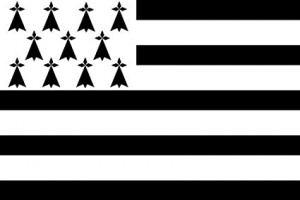Language/Breton/Vocabulary/Numbers
Demat, Breton Learners! 😃
➡ In today's lesson you will learn how to count in the Breton language spoken in Brittany (France).
Happy learning!
The Cardinal Numbers in Breton
Rules
Digits from zero to nine are rendered by specific nouns: mann [0], unan [1], daou / div (masculine/feminine) [2], tri / teir (masculine/feminine) [3], pevar / peder (masculine/feminine) [4], pemp [5], c'hwec'h [6], seizh [7], eizh [8] and nav [9].
The tens follow a vigesimal system (based on the number twenty): dek [10], ugent [20], tregont [30], daou-ugent (2*20) [40], hanter-kant (half-hundred) [ 50], tri-ugent (3*20) [60], dek ha tri-ugent (10+3*20) [70], pevar-ugent (4*20) [80] and dek ha pevar-ugent (10 +4*20) [90].
Compound numbers from eleven to nineteen are formed starting with the unit, followed by the root of the word for ten (dek): unnek [11], daouzek [12], trizek [13], pevarzek [14], pemzek [15], c'hwezek [16], seitek [17], triwec'h (literally, three sixes) [18] and naontek [19].
Compound numbers from twenty-one to twenty-nine are formed starting with the unit, followed by the particle warn (above), then the word for twenty (e.g.: unan warn ugent [21], c 'hwec'h warn ugent [26]).
Compound numbers from thirty-one to ninety-nine are formed starting with the unit (or the number 11 to 19), followed by the particle ha (and), and the ten (exp. : tri ha tregont [33], seizh ha hanter-kant [57], pevarzek ha tri-ugent [74]).
Hundreds are formed by placing the multiplier digit in front of the word for hundred (kant or c'hant), with the exception of one hundred itself: kant [100], daou c'hant [200], tri c'hant [ 300], pevar c'hant [400], pemp kant [500], c'hwec'h kant [600], seizh kant [700], eizh kant [800] and nav c'hant [900].
Thousands are formed by placing the multiplier figure in front of the word for thousand (mil or vil), with the exception of thousand itself: mil [1,000], daou vil [2,000], tri mil [3,000], pevar mil [4000], pemp mil [5000], c'hwec'h mil [6000], seizh mil [7000], eizh mil [8000] and nav mil [9000].
A million is called ur million, and a billion, ur billion.
Summary
| Number | Brezhoneg |
|---|---|
| 0 | mann |
| 1 | unan |
| 2 |
|
| 3 |
|
| 4 |
|
| 5 | pemp |
| 6 | c'hwec'h |
| 7 | seizh |
| 8 | eizh |
| 9 | nav |
| 10 | dek |
| 11 | unnek |
| 12 | daouzek |
| 13 | trizek |
| 14 | pevarzek |
| 15 | pemzek |
| 16 | c'hwezek |
| 17 | seitek |
| 18 | triwec'h |
| 19 | naontek |
| 20 | ugent |
| 30 | tregont |
| 40 | daou-ugent |
| 50 | hanter-kant |
| 60 | tri-ugent |
| 70 | dek ha tri-ugent |
| 80 | pevar-ugent |
| 90 | dek ha pevar-ugent |
| 100 | kant |
| 1,000 | mil |
| 1,000,000 | milion |
Sources
The Ordinal Numbers in Breton
| Brezhoneg | English | |
|---|---|---|
| 1o | kentañ, unanvet | first |
| 2o | eil, eilvet, daouvet, divvet | second |
| 3o | trede, trivet, teirvet | third |
The Fractions in Breton
| Brezhoneg | English | |
|---|---|---|
| 1/2 | hanter | half |
| 1/3 | trederenn | third |
| 1/4 | kard | quarter |
| % | an dregantad | percent |
| ar jederez | calculator |
Mathematics Vocabulary in Breton
| Breton | English |
| ar sammadur | addition |
| al lamadur | the subtraction |
| al liesadur | the multiplication |
| ar rannadur | the division |
| bras | big |
| brasoc'h eget/evit | bigger |
| bihan | small |
| bihanoc'h eget/evit | smaller |
| par da | equal |
| anpar da | different |

